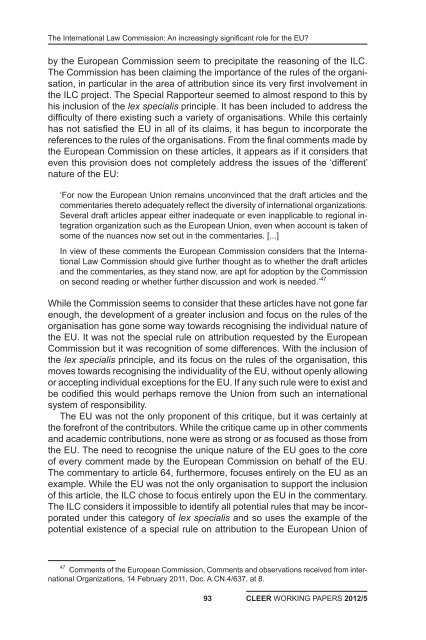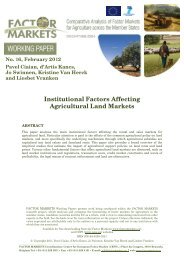CLEER WORKING PAPERS 2012/5McArdle <strong>and</strong> Cardwellthe continued critique <strong>of</strong> the articles being made in comments, such as thosefrom the European Commission, but also more generally in academic literature,that they did not sufficiently consider the variety <strong>of</strong> international organisations. 40Gaja reasoned, however, that the fact that not all articles would be relevant<strong>and</strong> apply to all organisations did not preclude these general provisions frombeing included in the draft. It was not necessary that all articles would have toapply to all organisations. He did consider, however, that particular features <strong>of</strong>certain organisations might affect the application <strong>of</strong> certain rules. 41 Gaja consideredthere to clearly exist special rules in certain situations that warrantedthe ability to make reference to them <strong>and</strong> deviate from the general regime beingdrafted by the ILC. 42 The Rapporteur considered that the inclusion <strong>of</strong> referenceto the possibility <strong>of</strong> specialised rules in this lex specialis provision wouldrespond to the critique that the draft articles take insufficient account <strong>of</strong> thevariety <strong>of</strong> organisations. 43Only one real change to this article was made by the ILC Drafting Committeefrom its first inclusion to the final set <strong>of</strong> articles adopted on second readingby the ILC. This change was to replace the phrase ‘such as the rules <strong>of</strong> theorganization’ with that <strong>of</strong> ‘including the rules <strong>of</strong> the organisation’. 44 The reasoningbehind this proposal furthermore reinforces the reasons behind its originalinclusion’ to emphasise the diversity <strong>of</strong> organisations <strong>and</strong> the need to apply thearticles in a flexible way. 45 It was felt by the Drafting Committee that thereneeded to be a greater emphasis on the specific characteristics <strong>of</strong> each organisation<strong>and</strong> so a greater reference on the rules <strong>of</strong> the organisation as forminga substantial part <strong>of</strong> the potential lex specialis that this article refers to. 46It is clear to see from Gaja’s statements that the very reason for the inclusion<strong>of</strong> this principle was that <strong>of</strong> the peculiarities <strong>of</strong> different international organisationsneeding to be taken into account. The arguments made from 2004 onwards40 Fifth Report on Responsibility <strong>of</strong> International Organizations 2007, A/CN.4/583, para. 7, at4, See Comments <strong>of</strong> the European Commission ‘Comments <strong>and</strong> Observations Received frominternational organizations’, 25 June 2004, A/CN.4/545, at 5; ‘Comments <strong>of</strong> the International MonetaryFund’, at 7; N. Blokker, ‘Preparing articles on Responsibility <strong>of</strong> International Organizations:Does the International Law Commission take International Organizations seriously? A mid-termreview’, in J. Klabbers <strong>and</strong> A. Wallendahl (eds.) Research H<strong>and</strong>book on the Law <strong>of</strong> internationalOrganizations, Cheltenham: Edward Elgar, 2011, at 321; See also P-J Kuijper, ‘Introduction tothe symposium on Responsibility <strong>of</strong> International Organizations <strong>and</strong> <strong>of</strong> (Member) states: Attributedor Direct Responsibility or Both?’ 7 International Organizations Law Review (2010) p.9; N.Blokker, ‘Abuse <strong>of</strong> the Members: Questions concerning Draft Article 16 <strong>of</strong> the Draft Articles onResponsibility <strong>of</strong> International Organizations’ 7 International Organizations Law Review (2010)p.35; A. Reinisch ‘Aid or Assistance <strong>and</strong> Direction <strong>and</strong> Control between states <strong>and</strong> InternationalOrganizations in the Commission <strong>of</strong> Internationally Wrongful Acts’ 7 International OrganizationsLaw Review (2010) p.6341 Fifth Report on Responsibility <strong>of</strong> International Organizations2007, A/CN.4/583, para. 7,at 4.42 Ibid. para. 7, at 4.43 Ibid. para.7, at 4.44 Statement <strong>of</strong> Drafting Committee, Statement <strong>of</strong> the Chairman <strong>of</strong> the Drafting CommitteeMr. Marcelo Vázquez-Bermúdez, 6 July 2009, at 6.45 Ibid. at 7.46 Ibid. at 7.92
The International Law Commission: An increasingly significant role for the <strong>EU</strong>?by the European Commission seem to precipitate the reasoning <strong>of</strong> the ILC.The Commission has been claiming the importance <strong>of</strong> the rules <strong>of</strong> the organisation,in particular in the area <strong>of</strong> attribution since its very first involvement inthe ILC project. The Special Rapporteur seemed to almost respond to this byhis inclusion <strong>of</strong> the lex specialis principle. It has been included to address thedifficulty <strong>of</strong> there existing such a variety <strong>of</strong> organisations. While this certainlyhas not satisfied the <strong>EU</strong> in all <strong>of</strong> its claims, it has begun to incorporate thereferences to the rules <strong>of</strong> the organisations. From the final comments made bythe European Commission on these articles, it appears as if it considers thateven this provision does not completely address the issues <strong>of</strong> the ‘different’nature <strong>of</strong> the <strong>EU</strong>:‘For now the European Union remains unconvinced that the draft articles <strong>and</strong> thecommentaries thereto adequately reflect the diversity <strong>of</strong> international organizations.Several draft articles appear either inadequate or even inapplicable to regional integrationorganization such as the European Union, even when account is taken <strong>of</strong>some <strong>of</strong> the nuances now set out in the commentaries. [...]In view <strong>of</strong> these comments the European Commission considers that the InternationalLaw Commission should give further thought as to whether the draft articles<strong>and</strong> the commentaries, as they st<strong>and</strong> now, are apt for adoption by the Commissionon second reading or whether further discussion <strong>and</strong> work is needed.’ 47While the Commission seems to consider that these articles have not gone farenough, the development <strong>of</strong> a greater inclusion <strong>and</strong> focus on the rules <strong>of</strong> theorganisation has gone some way towards recognising the individual nature <strong>of</strong>the <strong>EU</strong>. It was not the special rule on attribution requested by the EuropeanCommission but it was recognition <strong>of</strong> some differences. With the inclusion <strong>of</strong>the lex specialis principle, <strong>and</strong> its focus on the rules <strong>of</strong> the organisation, thismoves towards recognising the individuality <strong>of</strong> the <strong>EU</strong>, without openly allowingor accepting individual exceptions for the <strong>EU</strong>. If any such rule were to exist <strong>and</strong>be codified this would perhaps remove the Union from such an internationalsystem <strong>of</strong> responsibility.The <strong>EU</strong> was not the only proponent <strong>of</strong> this critique, but it was certainly atthe forefront <strong>of</strong> the contributors. While the critique came up in other comments<strong>and</strong> academic contributions, none were as strong or as focused as those fromthe <strong>EU</strong>. The need to recognise the unique nature <strong>of</strong> the <strong>EU</strong> goes to the core<strong>of</strong> every comment made by the European Commission on behalf <strong>of</strong> the <strong>EU</strong>.The commentary to article 64, furthermore, focuses entirely on the <strong>EU</strong> as anexample. While the <strong>EU</strong> was not the only organisation to support the inclusion<strong>of</strong> this article, the ILC chose to focus entirely upon the <strong>EU</strong> in the commentary.The ILC considers it impossible to identify all potential rules that may be incorporatedunder this category <strong>of</strong> lex specialis <strong>and</strong> so uses the example <strong>of</strong> thepotential existence <strong>of</strong> a special rule on attribution to the European Union <strong>of</strong>47 Comments <strong>of</strong> the European Commission, Comments <strong>and</strong> observations received from internationalOrganizations, 14 February 2011, Doc. A.CN.4/637, at 8.93CLEER WORKING PAPERS 2012/5
- Page 1:
Founded in 2008, the Centre for the
- Page 4 and 5:
CLEER WORKING PAPERS 2012/5Gosalbo
- Page 6 and 7:
CLEER WORKING PAPERS 2012/5Gosalbo
- Page 8 and 9:
CLEER WORKING PAPERS 2012/5Gosalbo
- Page 10 and 11:
CLEER WORKING PAPERS 2012/5Blockman
- Page 12 and 13:
CLEER WORKING PAPERS 2012/5Blockman
- Page 14 and 15:
CLEER WORKING PAPERS 2012/5Casolari
- Page 16 and 17:
CLEER WORKING PAPERS 2012/5Casolari
- Page 18 and 19:
CLEER WORKING PAPERS 2012/5Casolari
- Page 20 and 21:
CLEER WORKING PAPERS 2012/5Casolari
- Page 22 and 23:
CLEER WORKING PAPERS 2012/5Casolari
- Page 24 and 25:
CLEER WORKING PAPERS 2012/5Casolari
- Page 26 and 27:
CLEER WORKING PAPERS 2012/5Casolari
- Page 28 and 29:
CLEER WORKING PAPERS 2012/5Casolari
- Page 30 and 31:
CLEER WORKING PAPERS 2012/5Casolari
- Page 32 and 33:
CLEER WORKING PAPERS 2012/5Casolari
- Page 34 and 35:
CLEER WORKING PAPERS 2012/5Casolari
- Page 36 and 37:
CLEER WORKING PAPERS 2012/5Casolari
- Page 38 and 39:
CLEER WORKING PAPERS 2012/5Casolari
- Page 40 and 41:
CLEER WORKING PAPERS 2012/5Van Elsu
- Page 42 and 43:
CLEER WORKING PAPERS 2012/5Van Elsu
- Page 44 and 45: CLEER WORKING PAPERS 2012/5Van Elsu
- Page 46 and 47: CLEER WORKING PAPERS 2012/5Van Elsu
- Page 48 and 49: CLEER WORKING PAPERS 2012/5Van Elsu
- Page 50 and 51: CLEER WORKING PAPERS 2012/5Van Elsu
- Page 52 and 53: CLEER WORKING PAPERS 2012/5Van Elsu
- Page 54 and 55: CLEER WORKING PAPERS 2012/5Van Elsu
- Page 56 and 57: CLEER WORKING PAPERS 2012/5Van Elsu
- Page 58 and 59: CLEER WORKING PAPERS 2012/5Van Elsu
- Page 60 and 61: CLEER WORKING PAPERS 2012/5Van Elsu
- Page 62 and 63: CLEER WORKING PAPERS 2012/5Van Voor
- Page 64 and 65: CLEER WORKING PAPERS 2012/5Van Voor
- Page 66 and 67: CLEER WORKING PAPERS 2012/5Van Voor
- Page 68 and 69: CLEER WORKING PAPERS 2012/5Van Voor
- Page 70 and 71: CLEER WORKING PAPERS 2012/5Van Voor
- Page 72 and 73: CLEER WORKING PAPERS 2012/5Van Voor
- Page 74 and 75: CLEER WORKING PAPERS 2012/5Van Voor
- Page 76 and 77: CLEER WORKING PAPERS 2012/5Van Voor
- Page 78 and 79: CLEER WORKING PAPERS 2012/5Van Voor
- Page 80 and 81: CLEER WORKING PAPERS 2012/5Van Voor
- Page 82 and 83: CLEER WORKING PAPERS 2012/5Van Voor
- Page 84 and 85: CLEER WORKING PAPERS 2012/5Van Voor
- Page 86 and 87: CLEER WORKING PAPERS 2012/5McArdle
- Page 88 and 89: CLEER WORKING PAPERS 2012/5McArdle
- Page 90 and 91: CLEER WORKING PAPERS 2012/5McArdle
- Page 92 and 93: CLEER WORKING PAPERS 2012/5McArdle
- Page 96 and 97: CLEER WORKING PAPERS 2012/5McArdle
- Page 98 and 99: CLEER WORKING PAPERS 2012/5McArdle
- Page 100 and 101: CLEER WORKING PAPERS 2012/5McArdle
- Page 102 and 103: CLEER WORKING PAPERS 2012/5McArdle
- Page 104 and 105: CLEER WORKING PAPERS 2012/5McArdle
- Page 106 and 107: CLEER WORKING PAPERS 2012/5Eckeswit
- Page 108 and 109: CLEER WORKING PAPERS 2012/5Eckesdro
- Page 110 and 111: CLEER WORKING PAPERS 2012/5Eckesto
- Page 112 and 113: CLEER WORKING PAPERS 2012/5Eckesare
- Page 114 and 115: CLEER WORKING PAPERS 2012/5EckesEU
- Page 116 and 117: CLEER WORKING PAPERS 2012/5Eckeswil
- Page 118 and 119: CLEER WORKING PAPERS 2012/5EckesPar
- Page 120 and 121: CLEER WORKING PAPERS 2012/5Eckesthe
- Page 122 and 123: CLEER WORKING PAPERS 2012/5Eckesise
- Page 124 and 125: CLEER WORKING PAPERS 2012/5Eckesand
- Page 126 and 127: CLEER WORKING PAPERS 2012/5Eckesto
- Page 128 and 129: CLEER WORKING PAPERS 2012/5Eckesarg
- Page 130 and 131: CLEER WORKING PAPERS 2012/5Wouters,
- Page 132 and 133: CLEER WORKING PAPERS 2012/5Wouters,
- Page 134 and 135: CLEER WORKING PAPERS 2012/5Wouters,
- Page 136 and 137: CLEER WORKING PAPERS 2012/5Wouters,
- Page 138 and 139: CLEER WORKING PAPERS 2012/5Wouters,
- Page 140 and 141: CLEER WORKING PAPERS 2012/5Wouters,
- Page 142 and 143: CLEER WORKING PAPERS 2012/5Wouters,
- Page 144 and 145:
CLEER WORKING PAPERS 2012/5Wouters,
- Page 146:
CLEER WORKING PAPERS 2012/5Wouters,








